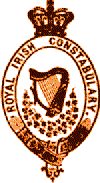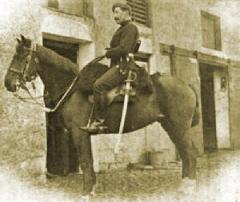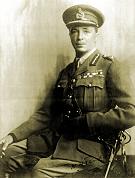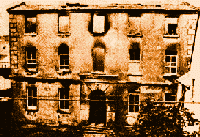
On June 19 the Republican forces were greatly strengthened in their struggle against the R.I.C. by the mutiny of the police in Listowel barracks. This incident had repercussions far beyond the confines of north Kerry. Indeed, it was an important factor in determining the outcome of the Anglo-Irish war. It was the dilemma in which most of the R.I.C. found themselves. As hostilities intensified they had to regard as their enemies most of the people from whom they had sprung. Consequently, within three months of this highly-publicised event, some 1,100 men resigned from the force. This was a crippling blow to the Black and Tans and a great influx of military, none of whom had the local knowledge or information which was all-important in trying to contain the republican's growing grip on the countryside.
 The mutiny itself had all the ingredients of high drama. It was triggered off by the visit of ex-war hero, Colonel Gerald Bryce Ferguson Smyth who, on June 3, had been appointed Divisional Police Commissioner for Munster. However, the situation had been building up for some days. On June 17 the police in Listowel were ordered to hand over their barracks to the British military and most of them were transferred to different stations in the district where they were to act as scouts for the troops. The police held a meeting and decided not to obey these orders. The following day the county inspector, Poer O'Shee, came to Listowel and when he tried to force the men to obey fourteen of them threatened to resign.
The mutiny itself had all the ingredients of high drama. It was triggered off by the visit of ex-war hero, Colonel Gerald Bryce Ferguson Smyth who, on June 3, had been appointed Divisional Police Commissioner for Munster. However, the situation had been building up for some days. On June 17 the police in Listowel were ordered to hand over their barracks to the British military and most of them were transferred to different stations in the district where they were to act as scouts for the troops. The police held a meeting and decided not to obey these orders. The following day the county inspector, Poer O'Shee, came to Listowel and when he tried to force the men to obey fourteen of them threatened to resign.
Next morning, June 19, Colonel Smyth arrived at Listowel barracks. He was accompanied by the inspector general, General Tudor, a commissioner of police from Dublin Castle, Major Letham, the county inspector, Poer O'Shee, the O.C. of the military stationed at Ballinruddery, Captain Chadwick, and Assistant County Inspector Dobbyn, and it was obvious that the purpose of his visit was to deal with insubordination on June 17.
 | Major General
Sir Hugh Tudor |
When the police had been assembled in the barrack-room he addressed them. He asserted that from then on the crown forces would have to take the offensive and beat the Republicans at its own game. To this end martial law would come into force immediately and by June 21 the police and military would be completely amalgamated. Then, together, police and military would engage in a ruthless pacification programme and if, in the course of it, innocent people were killed he would see to it that no policeman would have to answer for such an eventuality. He concluded by saying that the government wanted their assistance to wipe out the Republicans and that any man who was not prepared to help in doing so ought to leave the job at once.
Then came the first of a number of dramatic incidents. He approached the constable who stood at the top of the police line and pointing to him asked, 'Are you prepared to co-operate with me?' There was a tense moment or two as the constable, a Protestant from the north of Ireland, paused before replying that Constable Mee would speak for him. Thereupon Constable Jeremiah Mee startled Smyth, by saying, 'By your accent I take it you are an Englishman. You forget you are addressing Irishmen.' Then taking off his cap, belt and bayonet and laying them on the table, he continued: 'These too are English. Take them as a present from me, and to hell with you, you murderer.' Smyth immediately ordered Mee to be arrested.
As two army officers moved to take Mee away the rest of the police, prompted by Constable Thomas Hughes, crowded round them and refused to let them move.
After a few tense minutes Smyth ordered the officers to desist and together with all the visiting officers entered another room, adjoining the barrack day-room, in order to discuss the situation.
At this point Mee, on behalf of the police, wrote a note, which all signed, in which the entire group assumed responsibility for Mee's words and actions and indicated that they would resist Mee's arrest even to the point of bloodshed. Then ignoring Smyth, one of them handed the note to the inspector general. Another tense period followed while the officers considered this note. After about fifteen minutes the inspector general emerged from the adjoining room, shook hands with all the policemen and left with the visitors. The police who no longer felt safe in the barracks, held a meeting in the public-house then known as 'T.D. Sullivans' (now John B. Keane's Pub - owned by John B. Keane who wrote 'The Field' on which the movie of the same name was based) and, of the twenty-five of them who had been involved in the incident, fourteen, who were single, decided to resign.
However, two of these, John McNamara and Michael Kelly, were asked by Michael Collins, who was taking a personal interest in the entire matter, to stay on and carry out merely ordinary police duties. This they did and the following day, when summoned to appear before a court-martial, they demanded a civil trial instead. Next morning a high-ranking military officer arrived at the barracks and told them that they had been dismissed and ordered them to leave the barracks at once.
 |
Listowel RIC Barracks after it
was burned during the Civil War
in August 1922 |
At this stage there was a very important development. John McNamara went to James Crowley, V.S., who later that year became the Sinn Féin representative for north Kerry, and gave him a detailed account of what had happened and a statement, signed by the fourteen constables who resigned, describing the remarks of Colonel Smyth and requesting an official investigation into the incident. Crowley had the entire story printed by Robert I. (Bob) Cuthbertson and motored to Dublin in with it that afternoon, and the full story appeared in the first edition of the Freeman's Journal on the following morning. However, it was seen in good time by the authorities and was suppressed. Subsequently it appeared in the Freeman's Journal of 10 July 1920.
Copyright © 1974 - J. Anthony Gaughan.
|